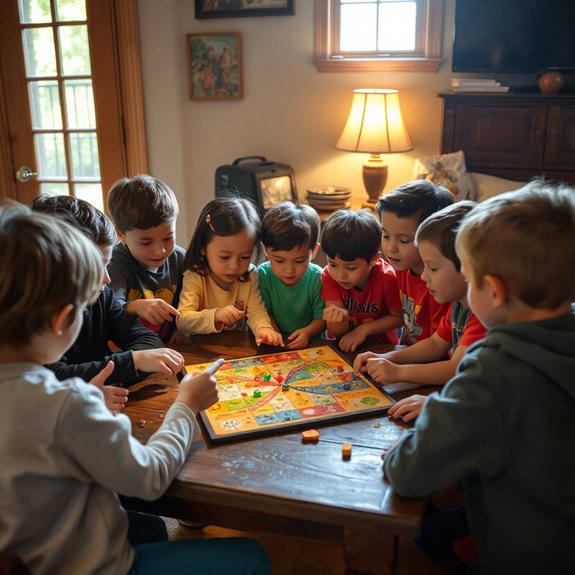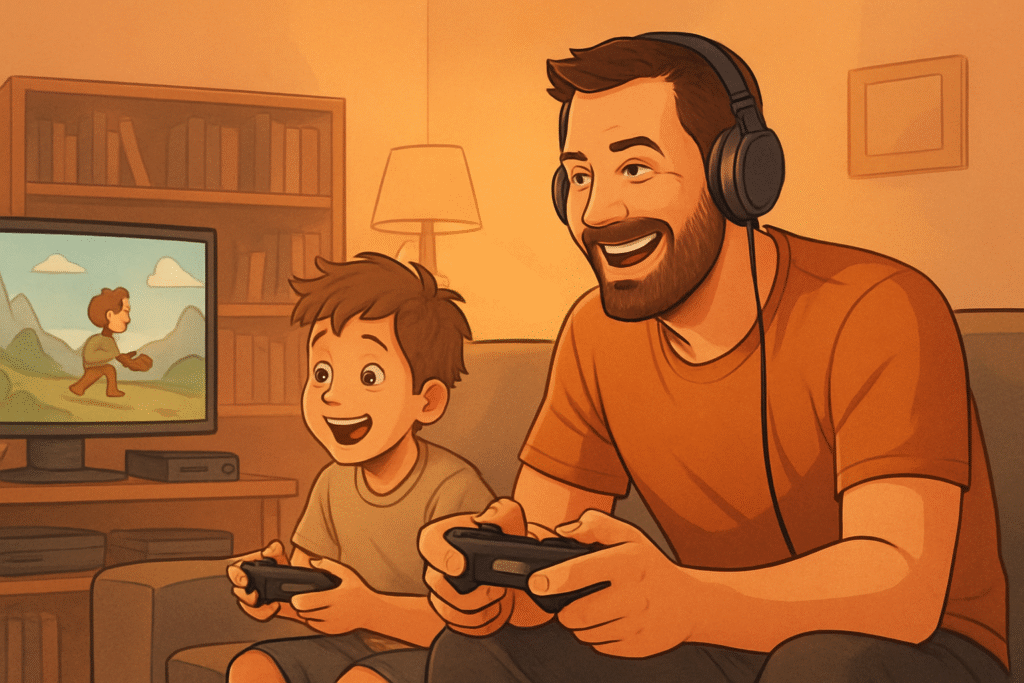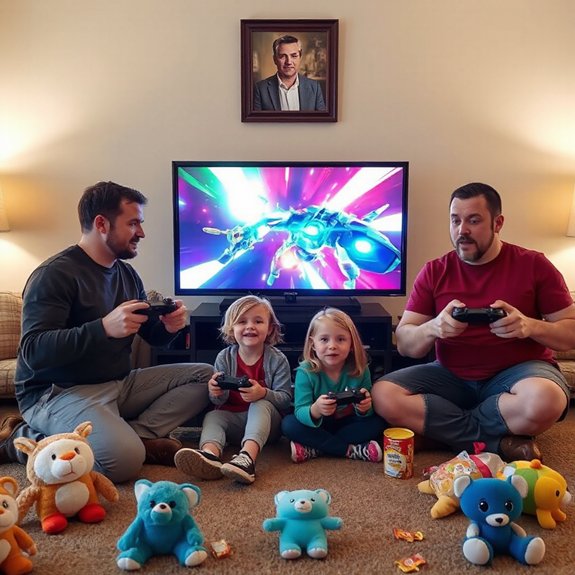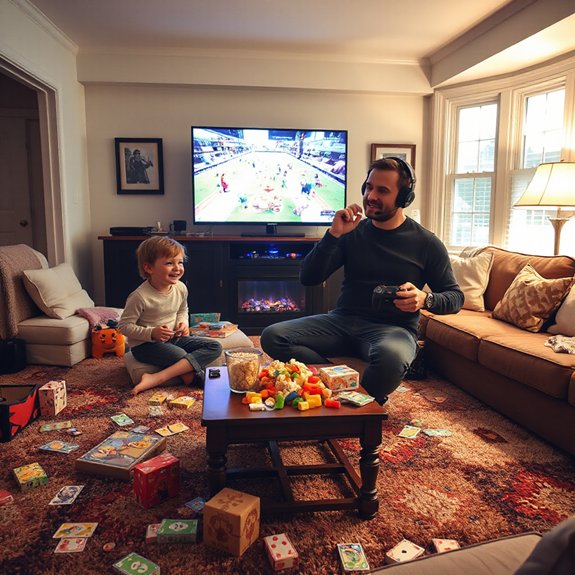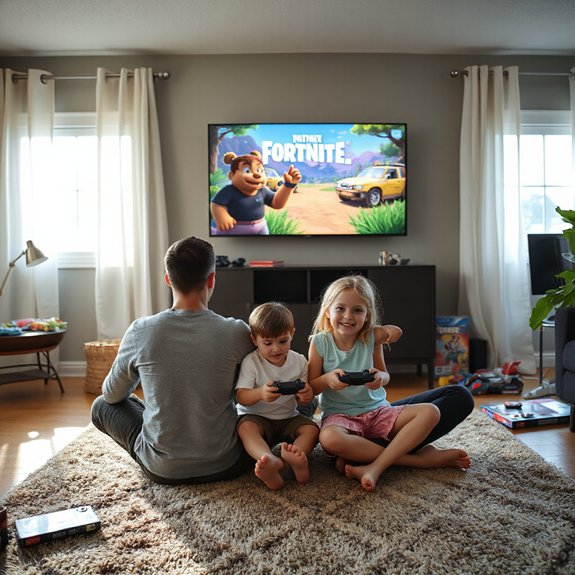Remember when Frodo had to read that ancient map to find his way to Mordor? Well, strategy games are kinda like that, except you don’t have to deal with orcs, just rules and challenges. You’re gonna love how these games can enhance your patience and reading skills while having a blast. Ever thought about discovering new vocab words just by playing? And yeah, there’s more to this journey—your curiosity’s about to level up!
Key Takeaways
- Strategy games enhance reading comprehension and decoding of complex texts.
- Patience is developed through planning and waiting for optimal strategic moves.
- Collaborative gameplay strengthens communication and respect for differing viewpoints.
- Engaging games improve vocabulary and comprehension skills through fun interactions.
- Choosing the right educational games makes learning enjoyable and rewarding.
The Role of Strategy Games in Literacy Development
Let’s plunge into the fascinating world where strategy games and literacy development cross paths!
Imagine yourself crushing it at your favorite strategy game. What if I told you that this epic quest is secretly enhancing your reading comprehension and word recognition? Yeah, it’s like leveling up in real life!
These games aren’t just about conquering kingdoms; they’re teaching you how to decode complex texts and understand narrative structures. As you plot your next move, you unknowingly improve your literacy skills.
Plus, chatting with friends about your strategy? That’s teamwork in action, also known as social skills development.
Cultivating Patience Through Game Challenges
Ever noticed how playing strategy games feels like waiting for your crush to text back?
You’re sitting there, fingers twitching, but you know you can’t just rush into it—you’ve got to wait for the right moment to strike!
These games teach you patience by making you plan your moves with the precision of a ninja and give you the satisfaction of solving problems like a pro, all while secretly turning you into a connoisseur of delayed gratification.
Delayed Gratification Skills
Have you ever tried waiting for your birthday when you know there’s a cake with your name on it? That’s delayed gratification in action!
It’s like playing chess or board games. You wait for the right moment, improving your patience and reading skills while anticipating those sweet victories. You know, studies show kids who excel in this skill tend to ace their academics and social life. Who knew waiting could do so much?
Strategy games teach patience, helping you make decisions, keep cool under pressure, and resist yelling, “Just give me the cake!” By exercising self-control, you get better at handling real-life situations where rewards aren’t instant.
Problem-Solving Patience
When you’re knee-deep in a strategy game, sweating bullets over whether to move your knight or build another settlement, you’re not just playing—you’re honing some serious problem-solving patience.
Seriously, who knew that taking your time could be so rewarding? These games teach you to pause, reflect, and make decisions like a seasoned chess expert. It’s not just about winning; it’s about embracing those “aha” moments when you finally crack the code.
Plus, your reading comprehension skills are getting a workout too, as you decipher game rules and plot strategies.
And let’s be honest, nothing beats the satisfaction of outsmarting an opponent after hours of plotting.
Enhancing Vocabulary and Comprehension With Play
You know how some people say learning can’t be fun? Well, they haven’t tried fun reading games that enhance your vocabulary and comprehension skills!
Imagine this: you’re diving into “Guess The Word” or playing detective in the “Word Detective Challenge.” It feels like a game night with friends, but you’re secretly flexing your brain muscles.
These games aren’t just about winning; they’re about learning, too. You start connecting words with their meanings, making predictions, and, before you know it, you’re a vocabulary wizard.
Games with narrative structures, like “Put The Story Together,” improve your understanding of causality and story elements. It’s like having a secret weapon in your backpack, helping you ace comprehension tasks!
Encouraging Collaborative Problem Solving
Hey there, strategy game enthusiast! When it comes to nurturing team communication and developing critical thinking, you’re in for a real treat—like finding fries at the bottom of the bag!
Imagine you and your friends, huddled around a board game, plotting your next move like experts, learning to talk it out and think ahead, all while cracking jokes about each other’s strategies (or lack thereof).
Fostering Team Communication
Imagine you’re in the middle of a heated strategy game, surrounded by friends, each with their own brilliant ideas and equally strong opinions. It’s like herding cats, right?
But this chaos is gold for building team communication. You guys aren’t just playing; you’re honing your collaborative skills and enhancing literacy skills. Every time you explain your strategy, you’re reinforcing vocabulary and comprehension.
Also, the more you discuss, the more you feel like a part of something bigger—like a secret club with its own language. This sense of belonging? It’s magic.
You’re learning patience, taking turns, and respecting each other’s viewpoints. Who knew a game could prep you for the real world, right?
Keep playing; you’re nailing it!
Developing Critical Thinking
When you’re knee-deep in a strategy game, trying to outwit your opponents and save the day, you’re not just having a blast—you’re sharpening your critical thinking skills too!
Imagine this: you’re evaluating your options, plotting moves like a chess grandmaster, and suddenly, bam! You’ve got the winning strategy, all thanks to the power of teamwork.
By collaborating, you’re not only honing your critical thinking but also enhancing language development and early literacy skills. Sharing your genius ideas with friends? That’s like a free language class!
And let’s face it, who doesn’t love a good brain flex that elevates your academic performance? So grab your buddies, pick up those strategy games, and release the brainy beast within. You’ve got this!
Selecting Engaging and Educational Games
Selecting the right game to enhance reading skills isn’t just important—it’s like finding the perfect pair of shoes that make you want to run a marathon!
You need games that are engaging, lighting up your literacy skills and phonics practice like a carnival ride. Imagine this: a phonics game that turns letter-sound matching into a hilarious treasure hunt with your friends. You’ll laugh, you’ll learn, and maybe even trip over a ladder or two. But isn’t that the fun part?
When you plunge into games that elevate comprehension, like those crazy cause-and-effect escapades, you’re not just a player; you’re a detective, piecing together clues.
Choose games that fit your style—digital thrills or hands-on quests—because learning should feel like a party, right?
Balancing Fun and Learning for Optimal Growth
Balancing fun and learning might sound like juggling flaming torches while riding a unicycle, but trust me, it’s not that hard!
Imagine this: you’re diving into a word-based Snakes and Ladders game. You’re having a blast, but guess what? You’re also enhancing your reading skills and learning patience. It’s like sneaking veggies into mac ‘n’ cheese!
Using strategy games, you create a supportive atmosphere where you and your friends can thrive. You’re not just playing; you’re building vocabulary, teamwork, and a love for reading.
The more fun it is, the more you want to learn. And when storytelling relay races make reading feel like a wild journey, who wouldn’t want to join in?
Final Thoughts
So, there you have it—strategy games aren’t just fun; they’re like a secret weapon for enhancing your reading skills and patience! Imagine leveling up your vocabulary while waiting for that perfect moment to strike in a game. It’s like multitasking on turbo mode! Plus, when you team up with friends, you’re not just winning games; you’re building epic teamwork skills. So next time someone says, “Stop playing games,” you can say, “I’m actually learning—game on!”

